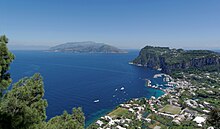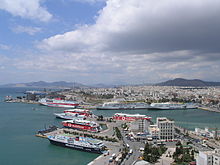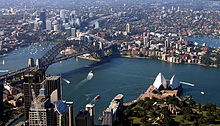Sheltered body of water where ships may shelter
New York Harbor and the Hudson River in the foreground; the East River in the background.Capri harbor, Italy seen from Anacapri Koyilandy Harbour, Kerala , IndiaA harbor (American English ), or harbour (Canadian English , British English ; see spelling differences ), is a sheltered body of water where ships , boats , and barges can be moored. The term harbor is often used interchangeably with port vessels and dropping off and picking up passengers. Harbors usually include one or more ports. Alexandria Port in Egypt, meanwhile, is an example of a port with two harbors.
Harbors may be natural or artificial. An artificial harbor can have deliberately constructed breakwaters , sea walls , or jetties or they can be constructed by dredging , which requires maintenance by further periodic dredging. An example of an artificial harbor is Long Beach Harbor , California , United States, which was an array of salt marshes and tidal flats too shallow for modern merchant ships before it was first dredged in the early 20th century.[1] Sydney Harbour , New South Wales , Australia, Halifax Harbour in Halifax , Nova Scotia , Canada and Trincomalee Harbour in Sri Lanka.
Artificial harbors
Artificial harbors are frequently built for use as ports. The oldest artificial harbor known is the Ancient Egyptian site at Wadi al-Jarf , on the Red Sea coast, which is at least 4500 years old (ca. 2600-2550 BCE, reign of King Khufu ). The largest artificially created harbor is Jebel Ali in Dubai .[2]
The Ancient Carthaginians constructed fortified, artificial harbors called cothons .
Natural harbors
Tanjung Perak is a famous example of a natural harbor in Indonesia . The harbor location in Madura Strait .A natural harbor is a landform where a section of a body of water is protected and deep enough to allow anchorage. Many such harbors are rias . Natural harbors have long been of great strategic naval and economic importance, and many great cities of the world are located on them. Having a protected harbor reduces or eliminates the need for breakwaters as it will result in calmer waves inside the harbor. Some examples are:
Bali Strait , IndonesiaBerehaven Harbour, Ireland
Balikpapan Bay in East Kalimantan , IndonesiaMumbai in Maharashtra , IndiaBoston Harbor in Massachusetts , United StatesBurrard Inlet in Vancouver , British Columbia , CanadaChittagong in Chittagong Division , Bangladesh Cork Harbour, Ireland Grand Harbour , Malta Guantánamo Bay , Cuba Gulf of Paria , Trinidad and Tobago Haifa Bay , in Haifa , Israel Halifax Harbour in Nova Scotia , CanadaHamilton Harbour in Ontario , CanadaKillybegs in County Donegal , IrelandKingston Harbour , Jamaica Mahón harbour, in Menorca , SpainMarsamxett Harbour , MaltaMilford Haven in Wales , United KingdomNew York Harbor in the United StatesPago Pago Harbor in American Samoa Pearl Harbor in Hawaii , United StatesPoole Harbour in England, United KingdomPort Hercules , MonacoSydney Harbour in New South Wales, Australia, technically a riaPort Stephens in AustraliaTanjung Perak in Surabaya , IndonesiaPort of Tobruk in Tobruk , Libya Presque Isle Bay in Pennsylvania , United StatesPrince William Sound in Alaska , United StatesPuget Sound in Washington state , United StatesRías Altas and Rías Baixas in Galicia , SpainRoadstead of Brest in Brittany , FranceSan Francisco Bay in California, United StatesScapa Flow in Scotland , United KingdomSept-Îles in Côte-Nord , Quebec , CanadaShelburne in Nova Scotia , CanadaSubic Bay in Zambales , PhilippinesTallinn Bay in Tallinn , Estonia Tampa Bay in Florida , United StatesTrincomalee Harbour , Sri Lanka Tuticorin in Tamil Nadu , IndiaVictoria Harbour in Hong Kong Visakhapatnam Harbour , IndiaVizhinjam in Trivandrum , IndiaWaitemata Harbour in Auckland , New ZealandManukau Harbour in Auckland, New ZealandPort Foster in Deception Island , Antarctica
Ice-free harbors
For harbors near the North and South poles , being ice-free is an important advantage, especially when it is year-round. Examples of these are:
The world's southernmost harbor, located at Antarctica 's Winter Quarters Bay (77° 50′ South), is sometimes ice-free, depending on the summertime pack ice conditions.[3]
Important harbors
The tiny harbor at the village of Clovelly , Devon , England Old Harbor in Lüneburg , Germany The harbor of Piraeus in Greece Port Jackson, Sydney The harbor of Gorey, Jersey falls dry at low tide. Punta del Este 's harbor – nicknamed the Monte Carlo of South America [4] [5] [6] The harbor in Aberystwyth , painted c. 1850 Although the world's busiest port is a contested title, in 2017 the world's busiest harbor by cargo tonnage was the Port of Ningbo-Zhoushan .[7]
The following are large natural harbors:
Algeciras , SpainAmsterdam , Port of Amsterdam , NetherlandsAntwerp , Port of Antwerp , BelgiumBaltimore 's Inner Harbor , Maryland , United StatesBotwood , Newfoundland , CanadaBremerhaven , GermanyBuenos Aires , ArgentinaBusan , South KoreaCalabar, Nigeria Cartagena, Colombia Charleston, South Carolina , United StatesChennai, Tamil Nadu , IndiaCochin Port , Kochi, Kerala , IndiaPort of Chittagong , Chittagong , Bangladesh Dnipro , UkraineDurban , South AfricaFalmouth , Cornwall , England, United KingdomFreetown Harbour , Sierra Leone Golden Horn , Istanbul , TurkeyGothenburg , SwedenGwangyang , South KoreaHai Phong Port , Haiphong , VietnamHaifa , IsraelHakodate , JapanHalifax Harbour , Nova Scotia , CanadaHamburg Harbour , GermanyHampton Roads , Norfolk, Virginia , United StatesHavana Harbor Helsinki , Finland Incheon , South Koreaİzmir , TurkeyPort of Jakarta (Tanjung Priok ), Jakarta , IndonesiaKaliningrad , RussiaKarachi , Sindh , PakistanKerch and Port Krym to Port Kavkaz , RussiaKyiv , UkraineKingston , JamaicaKobe Harbour , Kobe , JapanPort of Kolkata , Kolkata , West Bengal , IndiaPort of Lisbon , Lisbon , PortugalLushunkou , Dalian , ChinaMahón , Menorca , SpainManila Bay , PhilippinesMaputo , Mozambique Milford Haven , Wales , United KingdomMilwaukee , Wisconsin Montevideo , Uruguay Mumbai , IndiaNassau , Bahamas New York Harbor , United StatesMykolaiv , UkraineNovorossiysk and Anapa , RussiaOdesa , UkraineOsaka , JapanOslofjord and Oslo , NorwayPärnu , Estonia Plymouth Sound , Devon, England, United KingdomPort of Portland , Casco Bay , Maine , United StatesPort of Sevastopol , Sevastopol , CrimeaPort Phillip , Melbourne , Victoria, Australia Provincetown Harbor , Provincetown, Massachusetts , United StatesRio de Janeiro , Guanabara Bay , BrazilRostov-on-Don , RussiaRotterdam , Port of Rotterdam , NetherlandsSalvador , All Saint's Bay , BrazilSan Antonio, Chile San Diego Bay , San Diego, California , United StatesSaint Petersburg , RussiaSochi and Adlersky City District , RussiaStockholm , SwedenTallinn , EstoniaTanger-Med , Tangier , Morocco Tanjung Perak , Surabaya , IndonesiaTauranga Harbour , Tauranga , New ZealandTokyo Bay , Tokyo , JapanTrincomalee , Sri LankaTuticorin , Tamil Nadu , IndiaPort of Tyne , Tyne & Wear , United KingdomUlsan , South KoreaVictoria & Esquimalt Harbours , Victoria, British Columbia , CanadaVictoria Harbour (Hong Kong) Vizhinjam in Trivandrum , IndiaVladivostok , RussiaVyborg , RussiaWillemstad , Curaçao Wellington Harbour , New ZealandYevpatoria , UkraineZaporizhzhia , Ukraine Port of Szczecin , PolandValparaíso , Chile











